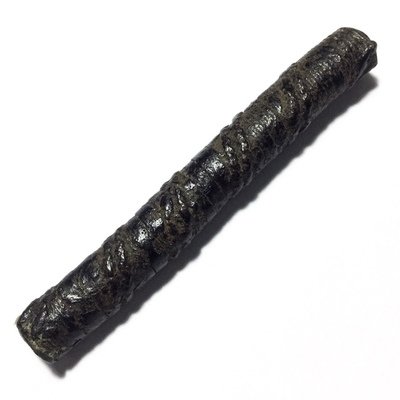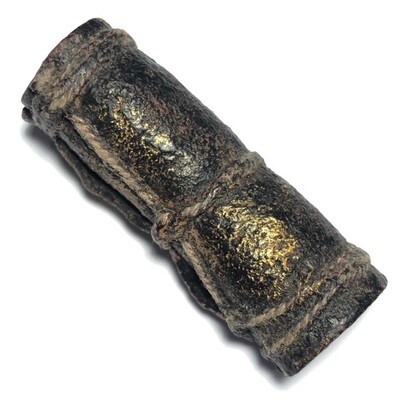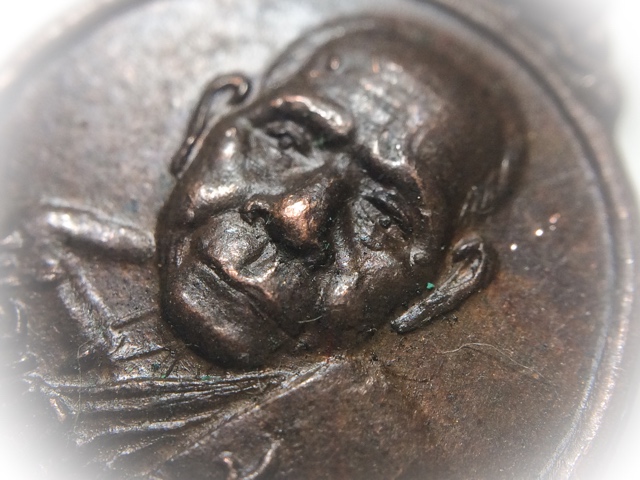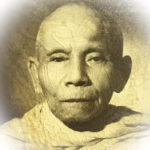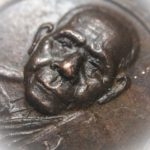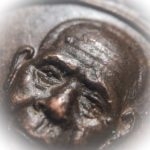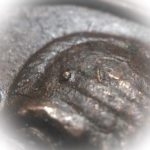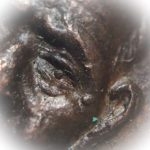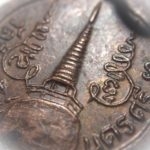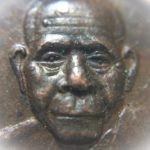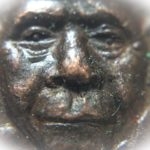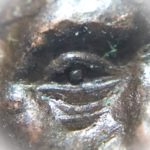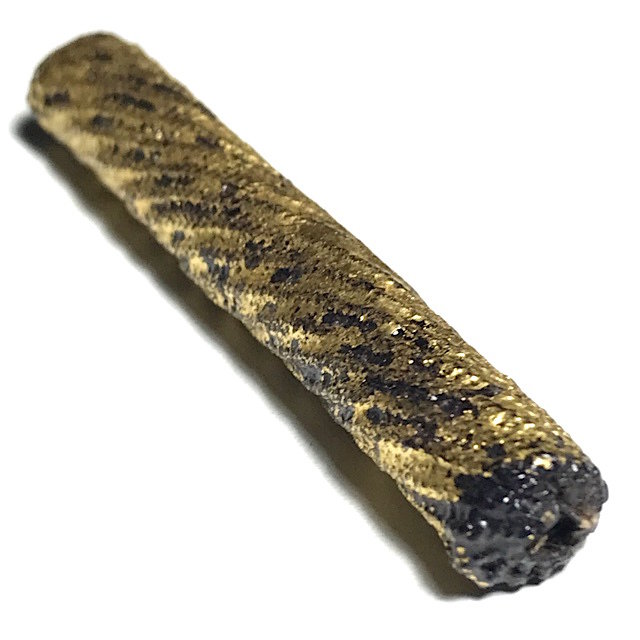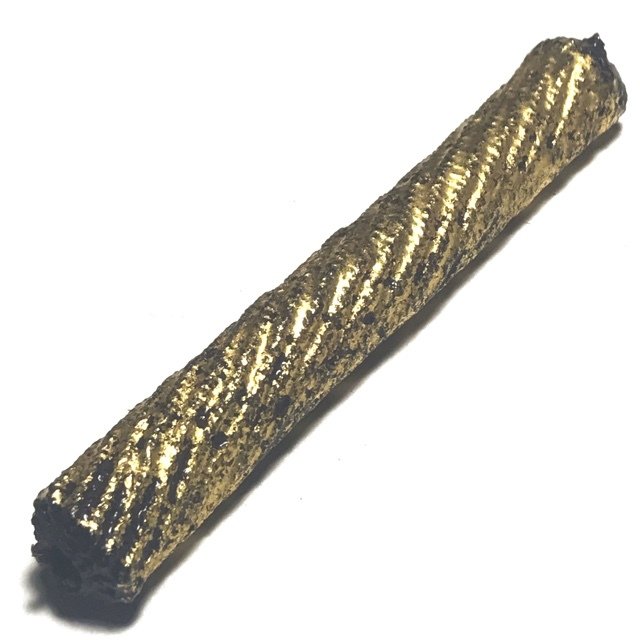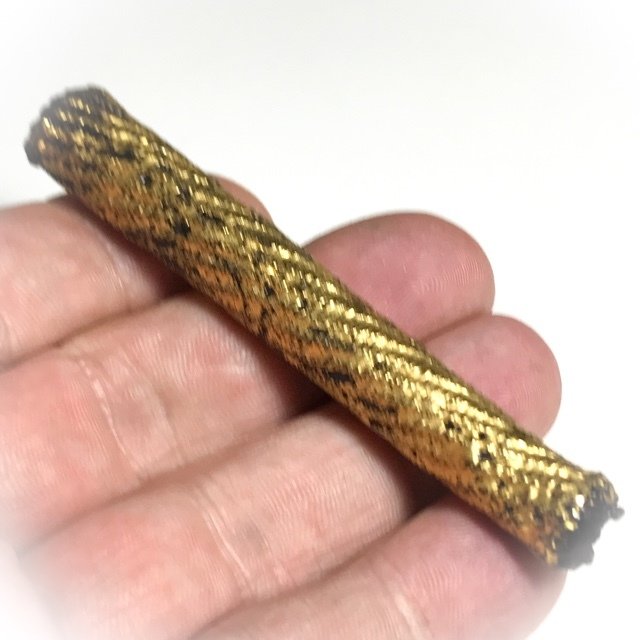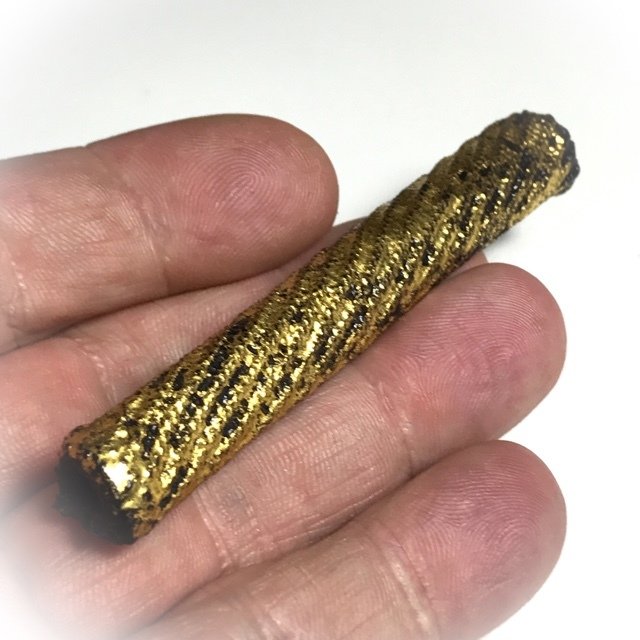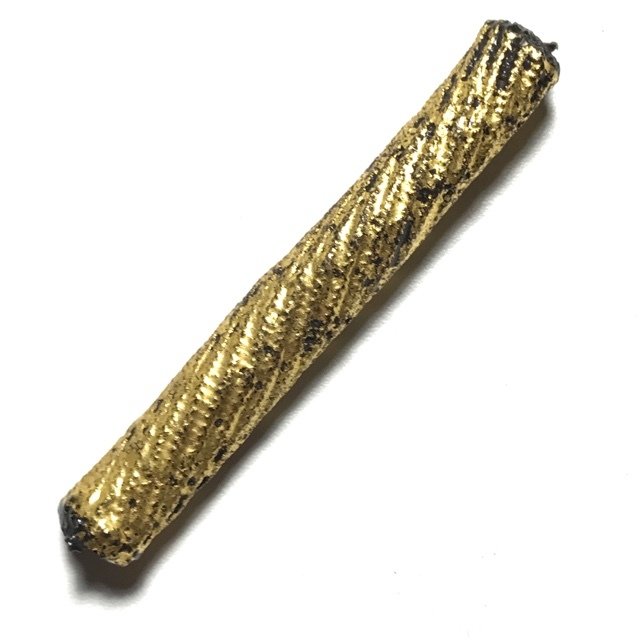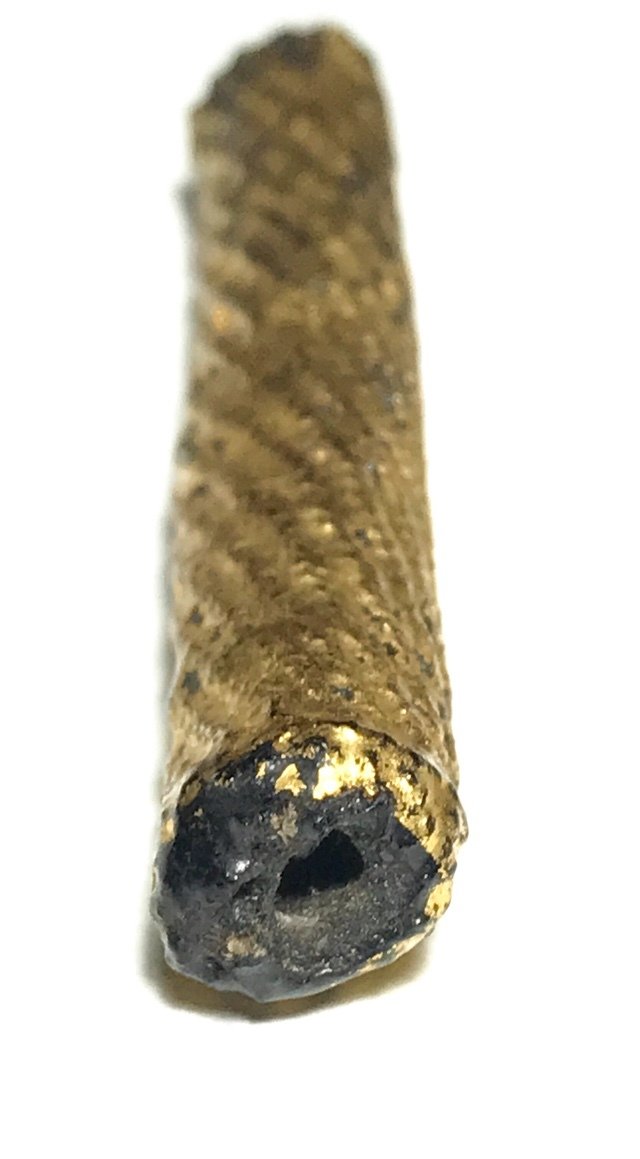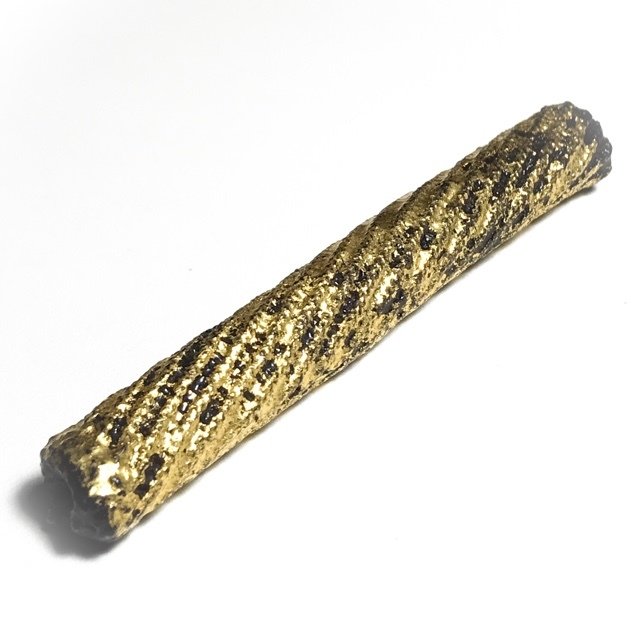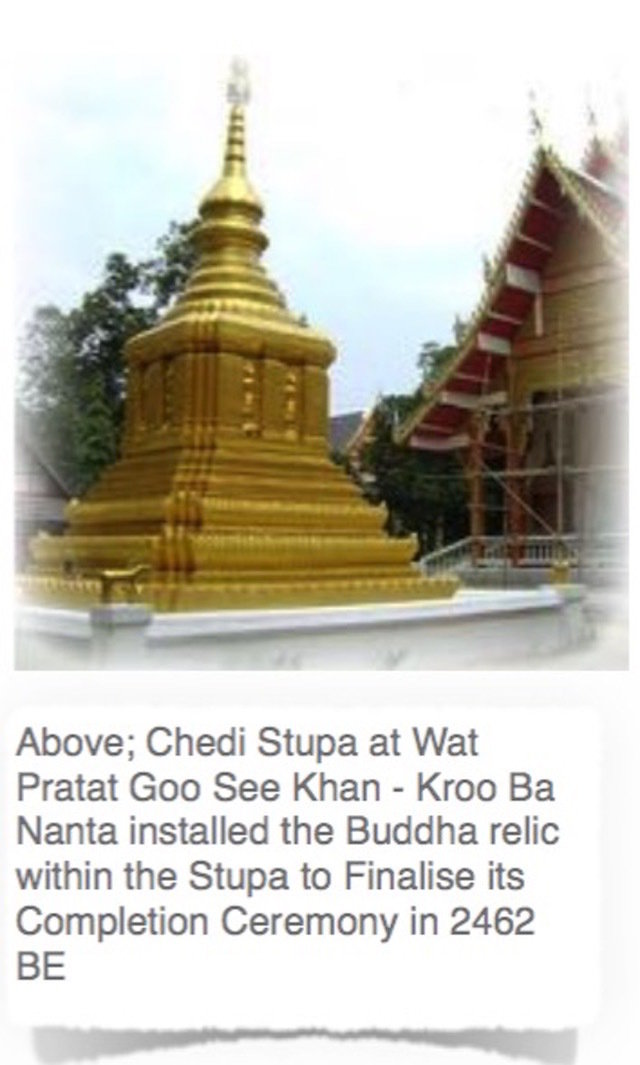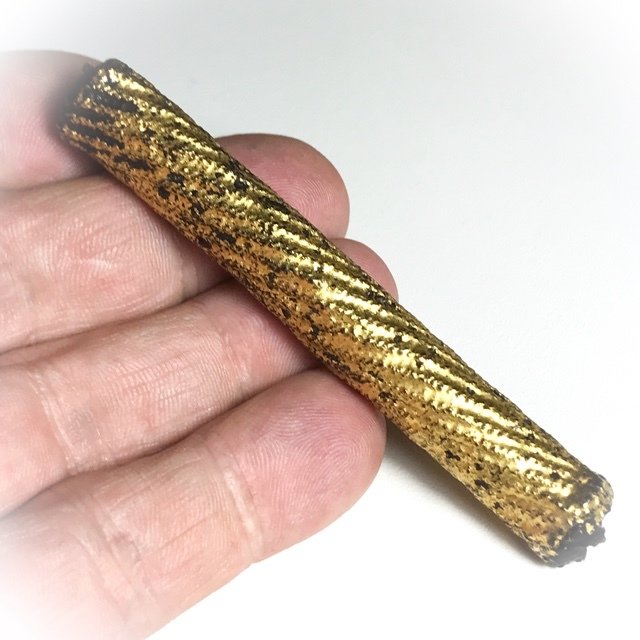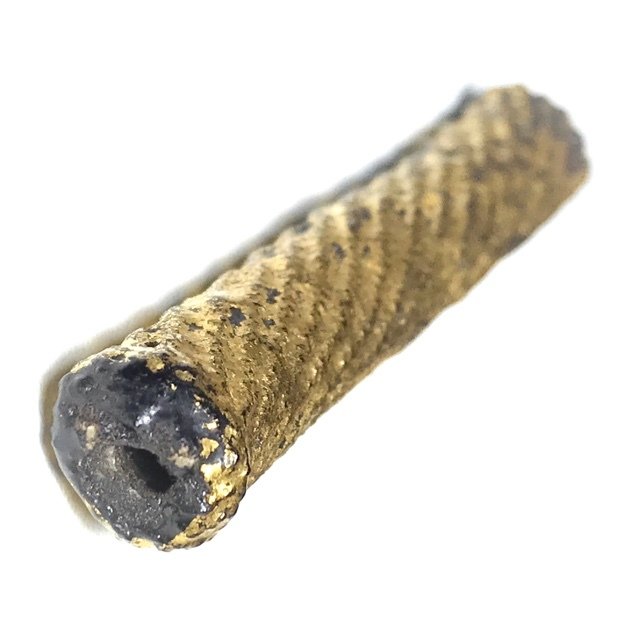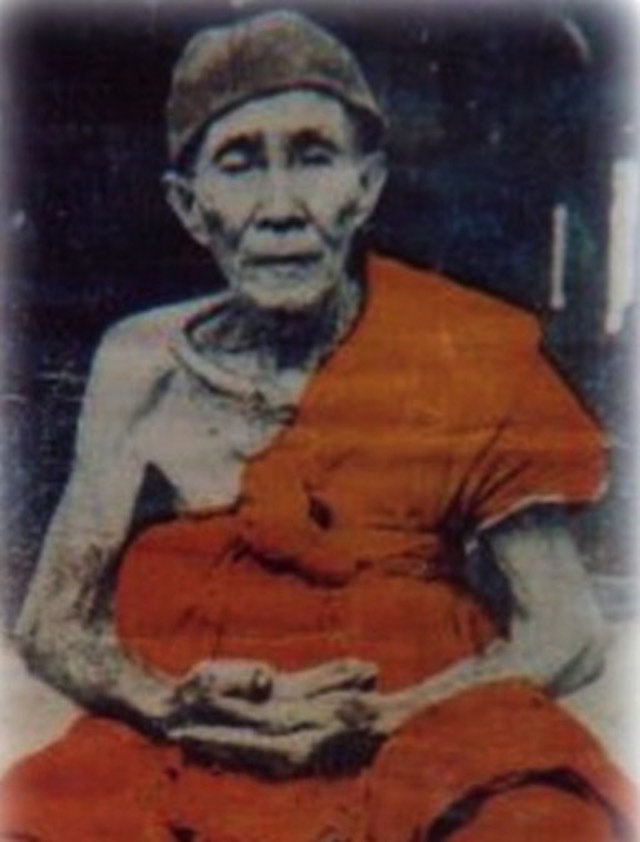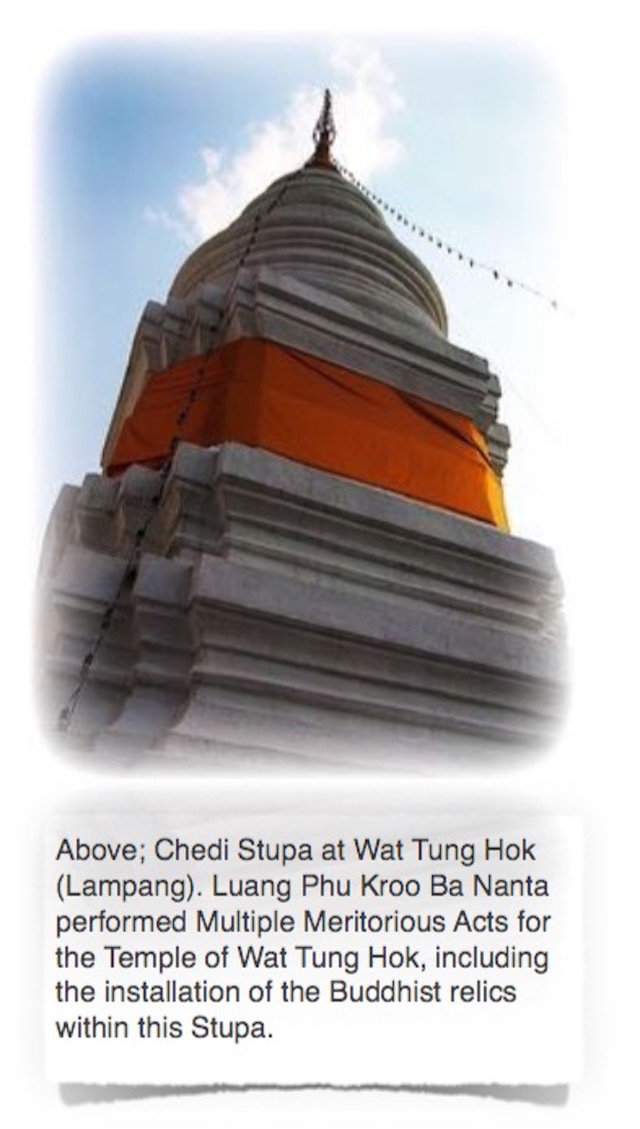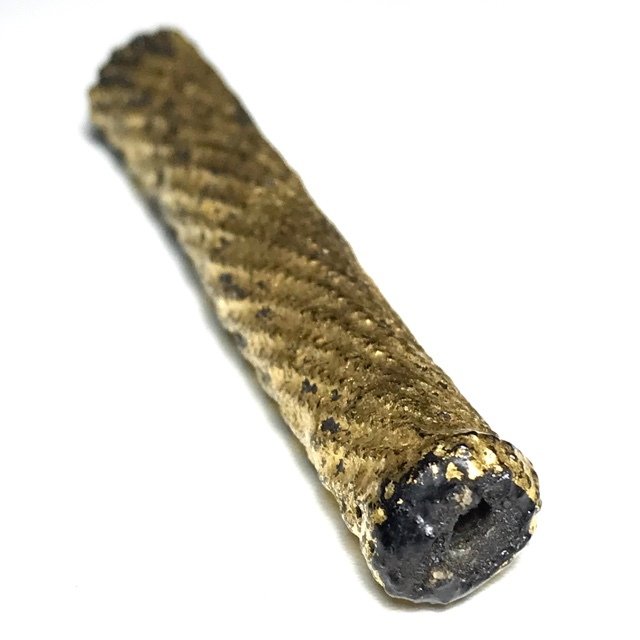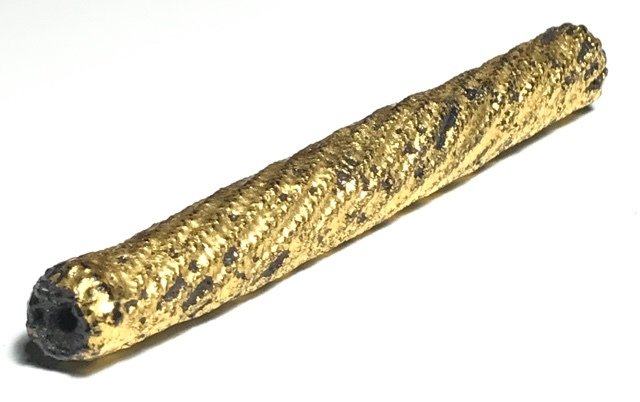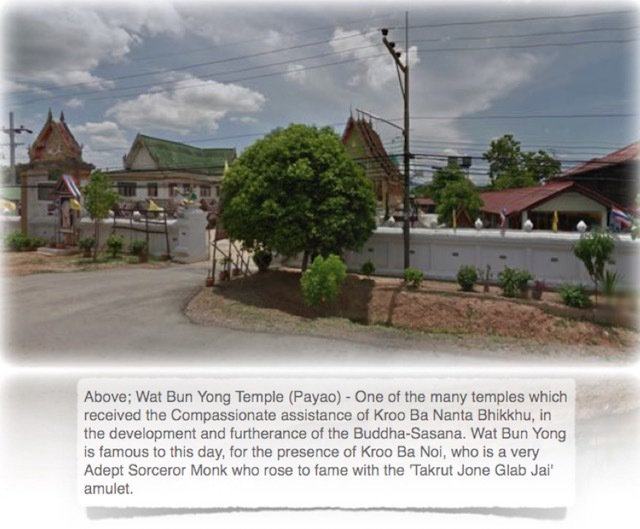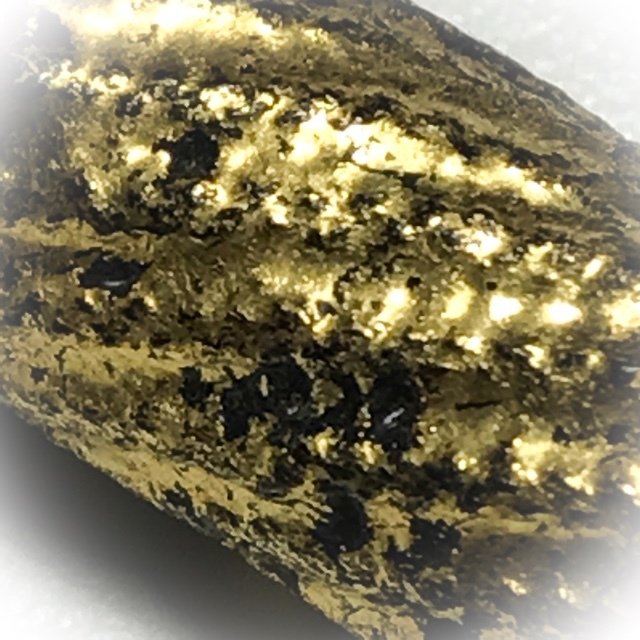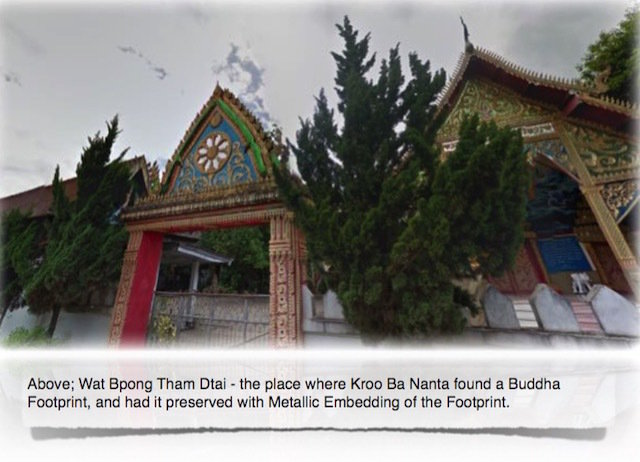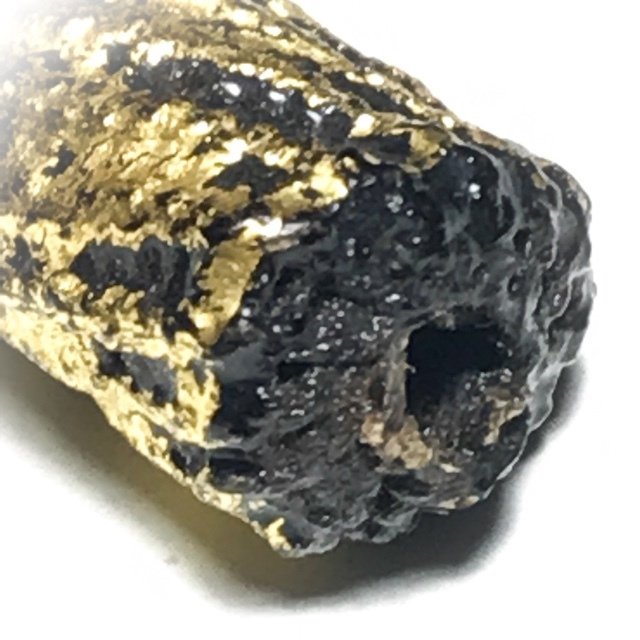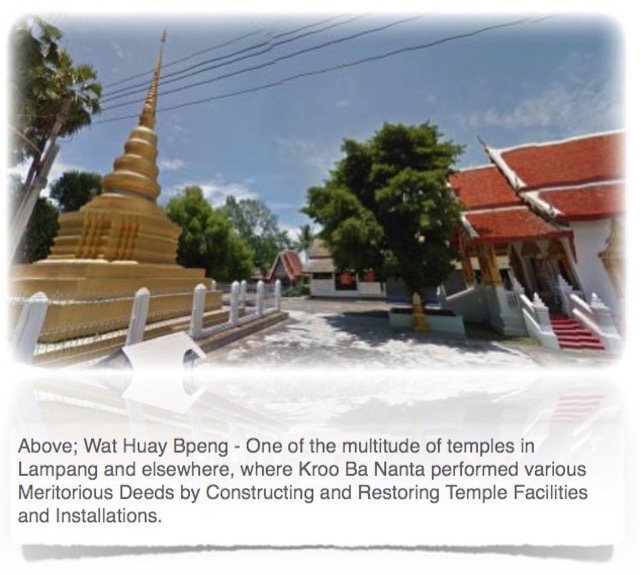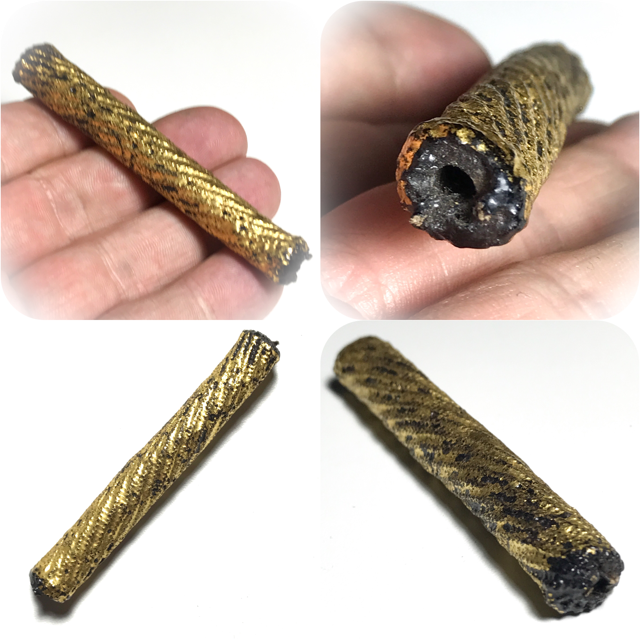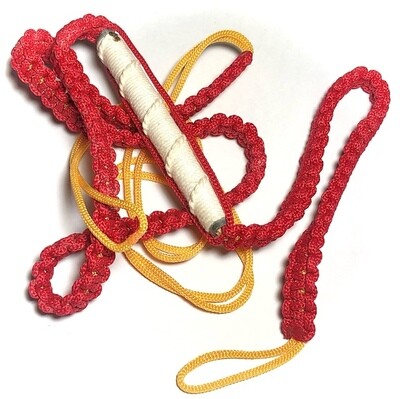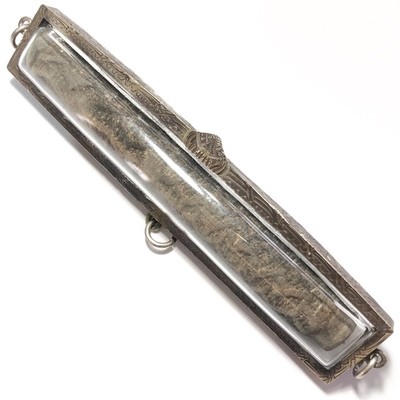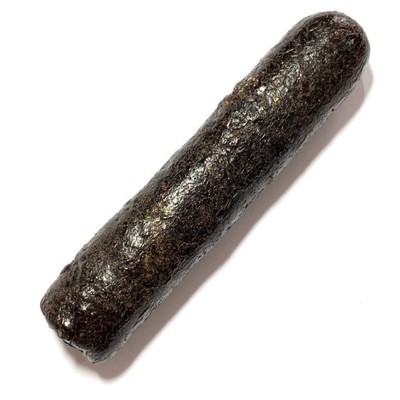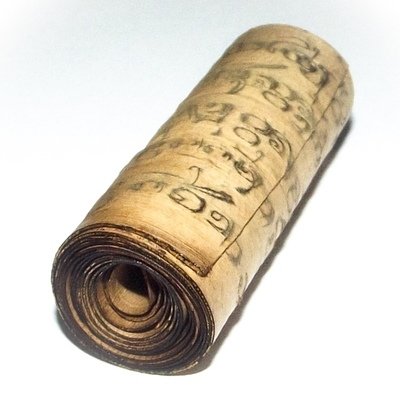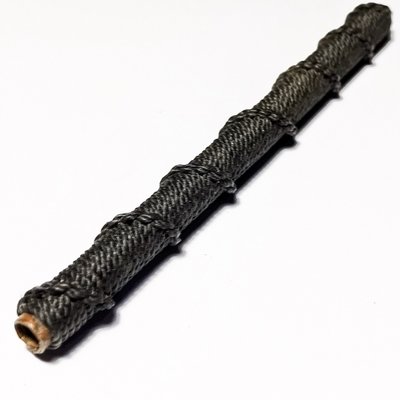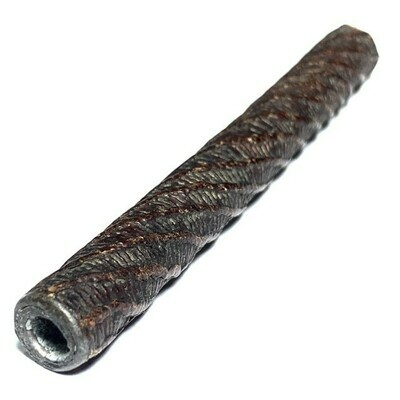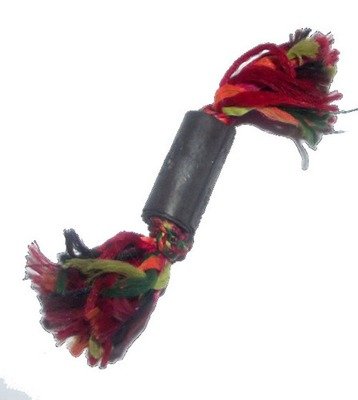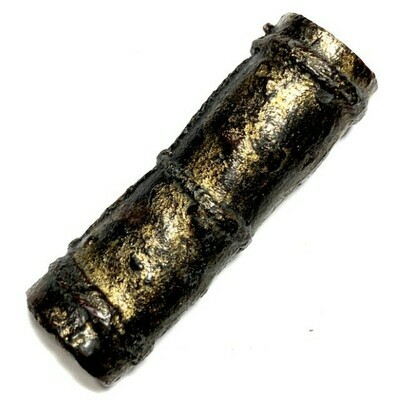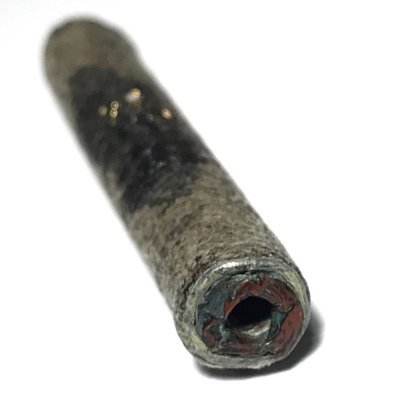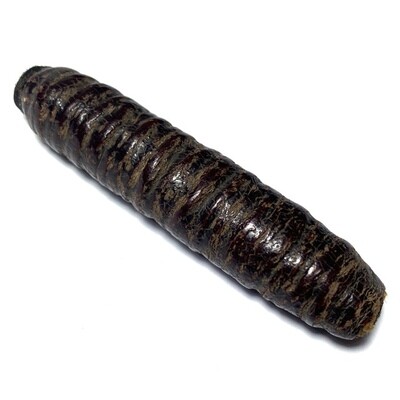Presenting a tiny but powerful and rare classic amulet from one of the Great Khao Or Masters of the 20th Century, Rian Glom Lek Hlang Chedi 2505 BE Nuea Tong Daeng Miniature Guru Monk Coin Por Tan Klai Wajasit
This Sacred amulet of the Great Khao Or Master of Nakorn Sri Tammarat, Master of Wat San Khan and Wat Pratat Noi, is a very rare amulet from Por Tan Klai’s 2505 BE Blessing Ceremony Edition, and is considered a ‘Jaek mae Krua’ type amulet (meaning ‘give to the kitchen maids and temple helpers’), which is suitable not only for men, but due to its miniature size, a perfect amulet for ladies or children to wear.
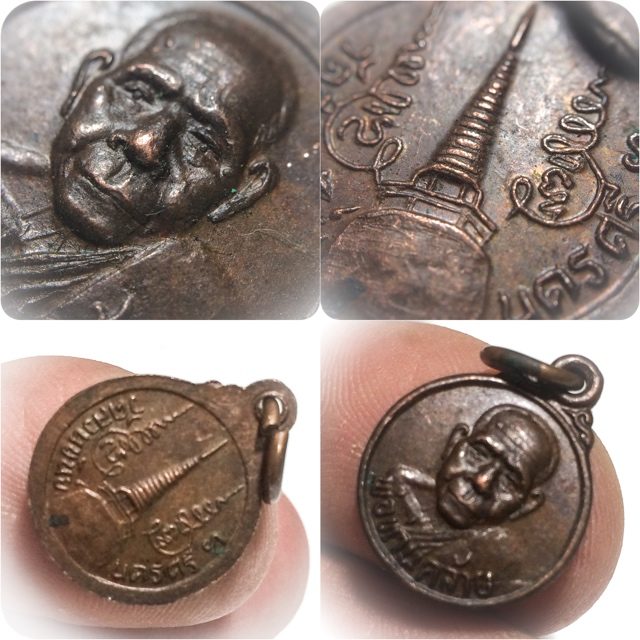
Rian Glom Lek 2505 BE Por Tan Klai Wajasit Wat Suan Khan
The 2505 BE edition of amulets of Por Tan Klai, is a highly preferred edition, which saw his famous ‘Rian Glom’ round Monk coin amulet with Chakra released, The Rian Glom Lek Hlang Chedi, and the Roop Tai Por Tan Klai Guru Monk Blesséd Photographamulets such as look om chan hmak and ya sen tobacco balls, and sacred powder amulets of various models.
A very rare and highly prized amulet for the devotees of Por Tan Klai to associate with his image and pray to him with a blessed image of the Guru, and the Chedi Relic Stupa on rear face for Buddhanussati and Marananussati. A powerful and Sacred amulet which has passed through the hands of the Guru and been blessed by him.
Por Tan Klai was one of the Top Guru Master Monks of the Last Century, and is considered one of the Four Great Masters of the Previous Generation of Lineage Masters of the Khao Or Southern Sorcery Lineage.
Kata Bucha Por Tan Klai
Takrut Tone Thak Chueak Long Rak Pid Tong Circa 2470 BE Kroo Ba Nanta Wat Tung Man Dtai
Takrut Tone Yantra scroll amulet cord wrapped with black herbal lacquer and gold leaf (3.2 Inches), from Olden days Lanna Master Guru Monk Kroo Ba Nanta Nanto Bhikku, of Wat Tung Man Dtai, in Lampang. Only very seldom does one see a Takrut from Kroo Ba Nanta, for he would make them by hand and distribute them individually to his devotees, making them amongst his rarest amulets, although one has to say that all of the amulets of Kroo Ba Nanta are extremely rare.
Kroo Ba Nanta made a large number of different Takrut and other amulets, which are all extremely rare and Sacred artifacts these days, and are less known outside of the Niche groups who seek and collect his whole Pantheon of amulets, due to the immense fame of the Pra Rahu Kala Ta Diaw Coconut Shell amulet being the amulet which takes the most of the limelight. The amulets of Kroo Ba Nanta are highly revered by his devotees for their magic power of protection and 'Serm Duang' Karma improving magical influence.
It is not known when Kroo Ba Nanta began making Amulets, except that old people who lived during his time, say that he had made them as long as they could remember. It is hence assumed that he began to make amulets from his early days thorughout his trajectory right up to his passing. His amulets can be split into three eras 1 'Yuk Dton' (early era) 2. Yuk Klang (mid era) and 3. Yuk Hlang (late era).
The earliest actual evidence of his making amulets was found inscribed on a Kala ta Diaw Rahu Image from Kroo ba Nanta with the year 2456 BE, which is considered to be one of his earlier one eyed coconut shell carvings.
Kroo ba Nanta Nanto Bhikkhu was famous for his Pra Rahu Amulets, and was considered the older of the 2 Greatest Masters of the Wicha Pra Rahu of that particular Era, the other most famous Master being of course Luang Por Noi, of Wat Srisa Tong.
Kroo Ba Nanta was the older of these two Great Guru masters of Wicha, both of whom were famous for the Pra Rahu, and also the Wua Tanu Sacred Arrow Bull animist charm. Many people believe that Kroo ba Nanta was the Kroo Ba Ajarn of Luang Por Noi, but this is in fact a myth. Each of these Masters had their own personal Trajectories and their amulets differ in style and empowerment methods.
It would be more accurate to not compare the two, and to see that Kroo Ba Nanta and Luang Por Noi are equally Meritorious in their Mastery, and were perhaps the greatest Adepts of Wicha Pra Rahu in living memory. It is said that during the times of great difficulty of the Monk Kroo Ba Srivichai, as Kroo ba Srivichai was placed under house arrest, that Kroo Ba Nanta made a Pra Rahu Kala Ta Diaw Amulet to pray to for the release of Kroo Ba Srivichai, and that he was released shortly after this.
Kroo Ba Nanta was born in 2415 BE, and was indeed the older of these two Great Guru masters of Wicha, both of whom were famous for the Pra Rahu, and also the Wua Tanu Sacred Arrow Bull animist charm.
Kroo Ba Nanta was an Upachaya Monk (entitled to ordain people as monks, which is one of the highest statuses), and was responsible for having built many important Buddhist Edifices in Lampang, Chiang Rai, Payao, and surrounding provinces, including Uposatha Shrine Rooms for temples, Chedi Stupas (22 in all), Kuti Huts, and 26 Vihara Shrines.
Kroo Ba Nanta, of Wat Tung Man Dtai in Lampang, was one of the Great Lanna Guru Master Monks of his Era, and is one of the more Historically Famous Lanna Monks of his Generation on a National, and International Scale. Known for his powerful Wicha Pra Rahu, In Koo, Wua Tanu and other Lanna Wicha, his amulets are amongst the rarest and highly preferred amulets of the genre. It would not be possible to write about Thai Lanna Sorcery and Amulets, without paying tribute to this Great Master.
Kroo Ba Jao Nanta was the son of Mr (Por Tao) Kam Bpa, and Mrs. (Mae Tao) Indta , with the common surname being 'Prohm Bping Bpao'. He was born at 19:30 Hours in the Year 2415 BE, in the tenth phase of the tenth Lunar Month, on a Saturday. He was born in the village of Ban Tung Man Dtai, in Ban Bpao, in Lampang Province. His parents raised him to the age of 12, whereupon they placed him under the care and tutelage of the Monks at the temple of Wat Tung Man Dtai.
He stayed in white clothes keeping the precepts at the temple for one year, and was then ordained as a Samanera Novice Monk, in the Year 2427 BE. He remained as a Samanera for nearly nine years and then, when he reached the age of 21, he was further ordained as a fully fledged Bhikkhu. He was given the 'Chāyā' (Name) of 'Nanta Bhikkhu'. Three years after his full ordination, Tan Jao Banya (Abbot of Wat Tung Man Dtai), disrobed, and bestowed the duties of the temple upon Kroo Ba Nanta Bhikkhu.
Since that day, Kroo Ba Nanta became Abbot, and cared for the temple throughout his life as a Bhikkhu. He spent his life focusing on the realisations of the 4 Sathipatana, the 4 Brahmacaryas, and the 10 Anussati. He developed very high attainments by his diligent efforts to focus on his duties, and develop his skills in meditation and Dhamma study, and to follow his Kroo Ba Ajarn.
In the year 2440 BE, a fire burned the temple of Wat Tung Man Dtai, and the rebuilding was comissioned and initiated by Kroo Ba Nanta, and the reconstruction process began in that year. By the year 2449 BE, the constuctions had reached the stage where the Vihara Shrine was ready to begin its instalment.
One year later in 2550 BE, the Vihara Shrine construction began, and continued for 10 months, with the final instalment of the Buddha-Rupa statue, and the Singha Lion Guardians were put into place. The Vihara Completion was celebrated officially in 2451 BE.
Once his own temple had been restored, Kroo Ba Nanta then turned to help other temples, and built Vihara Shrines at the temples of Wat Sob Prai (2452 BE), Wat Mae Ying (2453 BE), Wat Doi Ban Wor (2457 BE). In the year 2459 BE, Kroo Ba Nanta then returned his focus on his own temple and built a new Kuti Songk Sangha Dormitory Building at Wat Tung Man Dtai.
Also, at the same time period, he constructed another Vihara Shrine at the temple of Wat Ban Mai. In the year 2460, he performed the installation of the relic within the Stupa Chedi at Wat Tung Man Dtai completing the Wicha of Chedi Stupa Building as a Religious Relic Monument.
In the year 2462 BE, Kroo Ba Nanta's construction of the Kuti Songk Sangha Dormitory Building was conpleted and celebrated and Kroo Ba Nanta also installed relics in two more Chedi Stupas the Mon Gon Wee Stupa, and the Stupa at Wat Pratat Goo Si Khan, in Lampang, which can be seen in the picture below
In the same year, Kroo Ba Nanta installed the relics into another Chedi Stupa at Wat Ta Kraw Noi. And so that year, Kroo Ba Nanta. was responsible for 4 Great Meritorious Deeds.
In the next year of 2463 BE, Kroo Ba Nanta installed the final insertion of Buddhist relics within the completed Chedi Stupa at Wat Sri Bunyong, and then continued forwards, to construct the Vihara Shrine for Wat Mae Gong Pin Kam. In 2564 BE, Kroo Ba Nanta completed another 4 Great Meritorious Projects; The Vihara Shrine at Wat Pha Hiang Ngam. The raising of the Chatra Parasol over the Stupa at Wat Mon Gan Wee, and donated half a Kilo of sacred precious metals to the temple for the adornments.
Kroo Ba Nanta then went to raise the Chatra Parasol of the Chedi Stupa at Wat Ta Kraw Noi, and performed some more restorations at the temple of Wat Sri Bun Yong.
The People of Lampang Province began to notice the incredible ability and diligence of Kroo Ba Nanta, to help the Buddhist Religion to prosper and continue onwards into the future. he became extremely revered with his great charitable deeds, building Shrines and Stupas for the poorer provincial temples, and Restoring Ancient Relics.
In 2465 BE, Kroo Ba Nanta then raised the Chatra Prasol over the Chedi Stupa at Wat Doi Ban Wor, and made some other restorations and improvements for the temple. He then fulfilled the raising of the Yord Chatra Parasol Tip at the temple of Wat Goo See Khan in the same year. Two more Meritorious Projects completed in the year 2465 BE. In the year 2466 BE, Kroo Ba Nanta raised the Chatra parasol of the Stupa at Wat Mon Gon Wee, and stayed at the temple for a period of time. During his stay he financed the purchase of a very expensive Yord Chadtr (Chatra Spire), and donated it to the temple. In 2467 BE, Kroo Ba Nanta raised yet another Chatra Parasol over the Chedi Stupa at the temple of Wat Mon Juang, and also ventured back to Wat Ban Wor Mai, to perform further works of restoration and expansion projects.
He also then performed the final celebration ceremony, for the installation of various ceremonial installations, including the Taen Gaew, the Tammas Throne, Dork Lai Sau, the creation of 30 Kampira Grimoires, and two stone Buddha Statues at the temple. Three Great Works were performed in this Year.
2468 BE; Kroo Ba Nanta constructed a Vihara Shrine at the temple of Wat Mae Gong Don Chai, and thereafter went on to install a Chedi Stupa Relic at Wat Sala Bua Bok. In the next year of 2469 BE, Kroo Ba Nanta constructed a Vihara Shrine for the temple of Wat Pragaes. By this time, the multitude of temples he had helped and shown his generosity to and diligent efforts,, and the people of the various municipalities of Lampang, all had come to hear of the Great Merits of Luang Phu Kroo Ba Nanta Bhikkhu.
In 2470 BE Luang Phu Kroo Ba Nanta returned to Wat Tung Man Dtai and erected new Chatra Parasols for the Chedi Stupa in Grand Fashion; One large 9 Tiered Parasol, surrounded by 4 smaller Parasols with 3 tiers and four outer sides. After he completed this task, he went to Wat Tung Hok temple, and erected a Chatra Parasol for the Chedi Stupa there. Once he completed this task, he returned to the temple of Wat Sala Bua Bok once more, and constructed more edifices, as well as installing Eight Chatra Parasols over the Chedi Stupa.
Then he went to install the relics within the Stupa at Wat Tung Hok, and then travelled to Payao to begin building the temple of Wat Ban Pong. He stayed 3 days to oversee the initiatory phase, then Kroo Ba Nanta went to Wat Ban Mai to oversee the removal of the old delapidated Vihara Shrine, in preparation for the building of a new one.
In 2471 BE, Kroo Ba Nanta Presided over the Celebration Ceremony for the completion of the Putta Sima temple boundary construction at Wat Ban Bpao, and thereafter went to Wat Mae Gong Don Chai to perform the casting ceremony for 3 new Buddha-Rupa statues.
Afer he completed this task, he went on to perform the deconstruction of the old Vihara Shrine at Wat Ban Kae Luang, and took eight Lunar Cycles to finish erecting the foundations. Once the foundations of the Shrine were completed, Luang Phu Kroo Ba Nanta then used the Interim to travel to Wat Huay Bpeng to Install a Buddha-Rupa Statue.
In 2472 BE, Luang Phu Kroo Ba Nanta raised the Chatra Parasol over the Chedi of Wat Pra Gaes, attaching it to the Spire of the Stupa, and then returned to Wat Mae Gong Do Chai to perform the Ceremony for the Celebration of the Temple's New Buddha Statue.
2473 BE - Luang Phu Kroo Ba Nanta went to Wat Tung Hok and inserted Buddhist Relics within the Chedi Stupa, and performed other deeds of restorations and repairs to the temple. Luang Phu Kroo Ba Nanta had now reached the age of 58 years old, and it was at this time that he attained the reverend Status of Upachaya.
An Upachaya is the only kind of Buddhist Monk who can perform the Ordination Ceremony on another Monk. This status is only given to the Greatest Students and Practitioners of the Buddha-Sasana (Buddhism),who as Upachaya Ordaining Officers, have the duty to protect and preserve the Buddhist Canon and the Purity of the Sangha, by Ordaining with great Discretion. An Upachaya has the duty to teach the person who is to Ordain as a Bhikkhu, to understand and respect the 227 rules of restraint of the Buddhist Canon as laid out in the Vinaya Pitaka.
As he was promoted to become an Upachaya, shortly afterwards, he was invited to collaborate with the marking and construction Ceremony of the temple boundary wall (Putta Sima Wat), at Wat Mae Na Her. Kroo Ba also rested there for 9 Nights. After this Kroo Ba Nanta disappeared wandering in the forests for about a month, and reappeared at Wat Bpong Tham Dtai. He stayed there for three nights, and during his stay found a Buddha Footprint on the mountainside, and had it preserved with cast metal.
He then left for Wat Ban Mai, and restored and renewed various rooves, ceilings and walls in some of the buildings there. Then he returned to Wat Bpong Tham Dtai to perform a Celebration Blessing Ceremony to Celebrate the founding of the Buddha Footprint. Kroo Ba also donated funds to purchase cement and iron girders for their construction needs at the temple.
Kroo Ba Nanta stayed overnight after the ceremony and continued immediately onwards in his work, to Wat Tung Hee, and Wat Bpong Wang, to install Buddha-Rupa Statues in the Shrine Rooms at both temples.
Then Kroo Ba Nanta travelled tirelessly on to the temple of Wat Sob Saed, to install a Pratat Chedi Relic Stupa there. 5 days of work was performed and Kroo Ba Nanta told them to stop as he had some other business to see to.
Then Kroo Ba Nanta went to Wat Bpong Payao, and installed wind shutters and roof struts to the Uposatha Shrine Room there. He then returned to Wat Sob Saed, and in 17 days, finished the construction of the Chedi Stupa which had begun earlier and had been stopped temporarily for Kroo Ba Nanta to do his work at Wat Bpong Payao. After this, Kroo Ba returned to Wat Tung Man Dtai to attend to his own temple.
In 2474 BE, Kroo Ba Nanta installed three Chatra Parasols for the Chedi Relic Stupas of three temples, namely Wat Mae Ying, Wat Sob Saed, and Wat Mae Hew. He then continued on to Wat Nong Hlom to deconstruct the dfelapidated Vihara Shrine in preparation for the rebuilding of a new Shrine. He also donated a large stock of iron girders for the construction needs of the temple.
In 2475 BE, Kroo Ba Nanta took Bhikkhus and Samanera Novice Monks with him on Tudong travels, first stopping at Wat Sob Saed, after which he took them further, to reach the temple of Wat Ban Mai. After some time there, he took the apprentices to the Pratat relic at Ta Duea, where they performed some cleaning and restoration and preservation works for the relic.
Kroo Ba Nanta then guided the company of Monks back to Wat Ban Mai, where he let them stay for some 6 days, until he saw them starting to grow roots. Then he 'uprooted them' again and took them onwards to the temple of Wat Bun Yong (Wat Tung Man Mae Lao in the present time).
It was here at Wat Bun Yong at this time that Kroo Ba Nanta took the opportunity to perform the installation and sponsorship of a Buddha-Rupa image. Once the Buddha Abhiseka Ceremony was complete, Kroo Ba Nanta then took the Bhikkhus with him back to the Pratat Relic at Ta Duea, to finish the work they had begun there earlier. The finished building the relic Stupa there with a height of Circa 15 Meters. Once it was completed, Kroo Ba Nanta then installed a Chatra Parasol over the Stupa.
Kroo Ba Nanta then returned to Wat Bun Yong (Wat Tung Man Mae Lao), and gave Dhamma Sermons to the Monks and the Laity, to instruct them in proper applied Dhamma practice. The sermons lasted for about 4 days and nights. He then continued on to Wat Ban Mai to perform similar Sermons to the Monks and Laity, to enlighten them in their applied practice. He gave 2 days of Sermons there.
Then there was no time left, and Kroo Ba Nanta went on with his work and commitments at Wat Tung Hee, to create and install two more Buddha-Rupa Statues there at the temple. The two Buddha Statues were to be placed either side of the main Buddha Image in the Uposatha Shrine Room.
The Casting of the Buddha-Rupa Images was completed in a mere 4 days. Once they were completed, Kroo Ba Nanta then wandered to the temple of Wast Bpong Wang, to cast and create another Buddha-Rupa Statue for donation to the temple. In addition, Kroo Ba Nanta supervised the installation of Luad Lai decorative detailed desighn and stucco to be plastered around the inner and outer of the Vihara Shrine Room.
Continuing with his tireless work for the Temples of his Region, Kroo Ba Nanta then continued on to return to Wat Tung Man Dtai to attend to his own Temple, and on the way back there, to visit the temple of Wat Tung Ka, and the temple of Wat Ban Sar. In the Year 2476 BE, Kroo Ba and his Devotees travelled to begin the restoration of the Vihara of Wat Bor Haew, by removing the old delapidated parts in preparation for repair and rebuilding.
He also laid out the plans for the further restoration and trained some of the monks in the methods to be applied in the rebuilding, and left them with the commission of completing the task. He then travelled on to Wat Huay Moo to install a Chatra Parasol over the spire of the Chedi Stupa of the temple.
He then continued onwards to Wat Jom Jaeng and raised a Chatra Parasol over the Pratat Doi Ti Relic Stupa. Then he visited Wat Bpong Wang Dtai to celebrate its completion, and further on to the temple of Wat Ban Gor, to begin the erection of the new Vihara Shrine, after the removal of the final relics of the old delapidated shrine.In the year 2477 BE, he went to San Goo in Wiang Pha Bpao to chant the removal ceremony of the remains of the old Vihara Shrine, in preparation for the building of a newly restored Shrine.
The restored Chedi Stupa was completed, and Kroo Ba Nanta placed a Chatra Parasol over the Yord (spire). Kroo Ba Nanta then decided to travel and visit various temples to keep vigilance on their development and state of repair. He set off to return to Wat Tung Man Dtai, but first passed by the temples of Wat Ban Mai, Wat Rong Ko, Wat Tung Ka, Wat Ban Sa Jae Hom, and Wat Huay Bpeng, staying for one night at each of these temples. He then arrived home at his own temple of Wat Tung Man Dtai, and took time to attend to the development and needs of his temple.
But within a short period of time, the devotees of Wat Bor Haew beseeched Kroo Ba Nanta to come and bless the raising of the Vihara Shrine Room Window Blinds and Ceiling Struts, and the raising up of the main Buddha Image onto the Crystal Dais within the Shrine Room.
Kroo Ba Nanta conceded, and after this Ceremony went on to build a Chedi Stupa for the temple of Wat Bplay Na Hia. The whole Stupa took four days to erect, after which Kroo Ba Nanta oversaw that a Chatra parasol was Ceremonially installed to hane over the top spire of the Stupa. Once more Kroo Ba Nanta returned back to his duties at his own temple of Wat Tung Man Dtai for a couple of months.
Then, in the year 2498 BE, Kroo Ba Nanta began the building of the temple of Wat Sri Don Moon Chayasathan (also known as Wat Ban Hlao Pha Oy). As the project was two months into building, Kroo Ba Nanta left those in charge to continue, and went on to build the Kuti Monk Dwelling House at Wat Mae Gaeng Don Chai. Thereafter, Kroo Ba Nanta returned home to build a Hor Pra Tam (Tripitaka Shrine Room) for Wat Tung Man Dtai.
The building was completed after 4 months of hard work, then Kroo Ba Nanta travelled to begin the restoration of the Vihara Shrine at Wat Ban Rong. As the work was in process, Kroo Ba Nanta then went in the interim to go insert the Relics into the Chedi Stupa at Wat Plai Na Luang.
Then Kroo Ba went back to Wat Ban Mai, and began to dig a deep foundation for the Chedi Relics to be housed in, and laid relics inside the Chedi Stupa, after which a large religious celebration and ceremony was held.
In continuation, Kroo Ba Nanta went to Wat Ban Gor, and built a Radtana Ballangk (Adamantine Dais) for the Buddha statue, and then on to Wat Bpong Tham to restore one of the ancient Vihara Shrines there, which was in disarray.
Kroo Ba Nanta spent most of his ordained life making merits for Buddhism by constricting shrines and restoring old relics. He built an incedible number of Religious Monuments and ancilliary edifices, including Buddha Statues, Thrones for Statues, Kuti Monk Residence Halls, Sala Bprian and a total of 16 Vihara and Uposatha Shrine Rooms and 22 Chedi Stupas. His great deeds are a proof of his diligent practice, and are a testament to his Selflessness. These deeds stand in support of the belief his Devotees have in the power of his legendary amulets, which are as rare as they are Sacred.
During all the the travels and celebration ceremonies for all the auspicious events which Kroo Ba Nanta financed and attended, one can assume that Kroo Ba Nanta will have been distributing amulets throughout as time passed.
Because of the individuality of his amulets, each one being mostly hand made, the Pantheon of amulets of Kroo Ba Nanta consists of many different amulets, and there is little documentation of the whole Pantheon, with only his Kala Ta Diaw one eyed coconut shell carvings being the most documented.
For this reason, many devotees seek the coconut shell, and miss out on his many other extremely rare and spiritually valuable amulets. The true aficionado and collector of Kroo Ba Nanta's amulets knows however, that the Pantheon is vast, and one can spend a lifetime collecting them.
